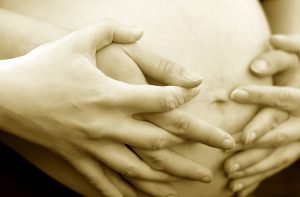Duke Fertility Center Offers Options for Everyone

With its full range of fertility treatment offerings and integrated team of male and female infertility specialists, a clinical psychologist, nurses, embryologists, and support staff, the Duke Fertility Center is well equipped to provide support for anyone who wishes to build their family, including heterosexual or lesbian, gay, bisexual, transgender, intersex, and queer (LGBTIQ) couples, as well as single men and women.
During their first visit, couples or individuals undergo an initial consultation with a fertility specialist to discuss their medical history and develop an individualized plan for evaluation. Testing is tailored to the individual needs of the patient and can include laboratory studies, ovulation testing, pelvic ultrasonography, 3-dimensional sonography, hysterosalpingography, and semen analysis.
Following the initial evaluation, patients return to discuss treatment options. These can range from simple, noninvasive approaches, such as natural cycle monitoring, to more time-intensive treatments such as intrauterine insemination and in vitro fertilization (IVF). Surgical options are also available, including hysteroscopy, laparoscopy, and microscopic surgery.
It’s important for patients to be made aware of the center’s broad spectrum of treatment options, says William Hurd, MD, director of the Duke Division of Reproductive Endocrinology and Infertility. "Many patients may presume they can’t afford fertility treatment, because they are only aware of IVF, which they know can be costly,” he explains. “We always try to use the most cost-effective treatment that is likely to result in pregnancy."
The Duke Fertility Center seeks to make fertility treatments more approachable and provide patients with the information they need to make an informed decision, agrees Karen Baker, MD, a male infertility specialist who practices at the center: “Patients need to be given the chance to discuss all of their options. It allows them to engage in their health care as opposed to just experiencing it as something that’s happening to them—that’s something that I think has been undervalued.”
Family Building
In addition to offering various methods for maximizing fertility in heterosexual couples, the center has the latest options to help LGBTIQ couples and single women and men achieve their parenthood goals.
Same-Sex Couples
Family planning for same-sex couples begins with routine fertility testing. Same-sex female couples are most commonly treated with donor intrauterine insemination, whereas IVF is reserved for challenging or special situations. For same-sex male couples, a gestational surrogate and donor eggs are required. Sperm from one or both partners is used to fertilize the eggs for IVF.
Transgender Family Building
The Duke Fertility Center can help people plan ahead if they are in the process of or planning on transitioning. For example, sperm cryopreservation is available for transwomen. Transmen may opt for oocyte cryopreservation and/or embryo cryopreservation using partner or donor sperm. While attempting reproduction, transgender people will usually have to temporarily discontinue exogenous hormone therapy.
Fertility Preservation
Many men and women are interested in preserving their fertility potential prior to cancer therapy or because of concerns about aging. Options include egg, sperm, or embryo cryopreservation. Specimens can be stored in liquid nitrogen for as long as the patient wishes.
"Anyone with reproductive concerns is encouraged to come in to discuss the options available," Hurd says. "Our goal is to help every couple and individual to determine the most effective and affordable options available to reach their family-building goals. The key is to tailor both the evaluation and treatment approaches to the needs of the individuals we serve."